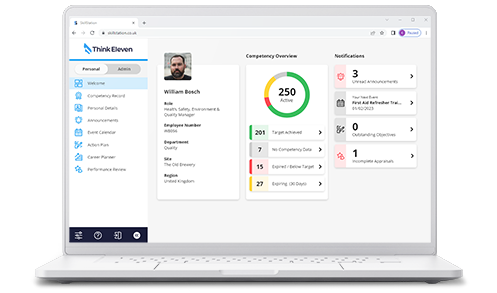Succession Planning
Providing visibility of key staff critical roles and succession risk

What is Succession Planning?
Succession planning is the process of proactively transferring knowledge, skills and competencies across people within an organisation to prevent the risks associated with absence and staff turnover (such as skill shortages, inexperience and/or incompetence). It is also an essential process for any organisation that needs to minimise the impact of unforeseen staff turnover.
A successful and proactive succession planning strategy will mitigate the risk and impact of people leaving your organisation. This ensures that your organisation will continue to perform optimally in the event of planned or unplanned absence, staff turnover, or organisational restructure.
Succession planning offers numerous advantages for organisations, including:
- Proactive Risk Identification: Succession planning allows organisations to proactively identify potential risks associated with key roles and critical skills gaps, more commonly referred to as single-point failures. By recognising these risks early on, organisations can develop strategies to mitigate them effectively.
- Strategic Talent Review: Through periodic reviews of key roles and critical skills, succession planning enables organisations to strategically assess their talent pool. This assessment ensures that the organisation has the right people in place to meet current and future business needs.
- Effective Risk Management: By identifying potential risks and developing strategies to address them, succession planning helps organisations manage talent-related risks more effectively. This proactive approach reduces the impact of staff turnover and ensures business continuity and resilience.
- Enhanced Employee Engagement: Succession planning communicates to employees that the organisation values their contributions and is committed to their professional development. This fosters a sense of loyalty and engagement among employees, leading to higher retention rates.
- Improved Organisational Agility: With a well-developed succession plan in place, organisations can respond quickly and effectively to unexpected changes in leadership or critical skill gaps. This agility enables organisations to adapt more effectively to changing conditions and maintain, or gain, a competitive edge.
By implementing effective succession planning processes, organisations can ensure long-term sustainability and success by cultivating a strong leadership and talent pipeline and fostering a culture of continuous development and growth.
The benefits of effective succession planning can extend beyond just organisational stability and growth. Benefits can also include:
- Leadership Continuity: Ensuring a seamless transition of leadership positions, maintaining stability, and minimising disruptions.
- Talent Development: Providing opportunities for employees to develop skills and capabilities, fostering a culture of growth and advancement.
- Enhanced Employee Morale: Demonstrating commitment to employees' growth and career advancement, leading to higher levels of engagement and retention.
- Risk Mitigation: Identifying and addressing potential gaps in key roles and critical skills, reducing the impact of turnover and unforeseen events..
- Strategic Alignment: Aligning talent development efforts with organisational goals and objectives, ensuring the workforce is equipped to meet evolving business needs.
- Competitive Advantage: Building a robust pipeline of future leaders and skilled professionals, maintaining a competitive edge in the market.
By embracing succession planning, organisations can not only ensure business continuity but also deliver a culture of talent development, resilience, and long-term success.
Objectivity based on data and evidence
Objectivity is key and should reduce (or even better, entirely remove) what is typically a subjective process. This will ensure that your identification and selection is based on evidence of capability. It is important to keep personalities, relationships, favourites and length of service out of this process. It should be focused on identifying the right person for the role, or identifying a person/pool of people who could be developed in preparation for key roles and positions.
Your Competency Framework should help inform this process and not only focus on technical skills, but define the knowledge, skills and competencies for every aspect of a role including values, behaviours and cultural alignment.
Knowledge Transfer
Your succession plans should account for knowledge transfer and the development of the those being earmarked as successors (or future leaders). It takes time to up-skill and develop your talent pool, and so a proactive approach is encouraged. This has been further compounded by the removal of the retirement age in the UK, and people living longer lives has introduced more uncertainty into this important aspect of organisational management and contingency planning.
It's not just focusing on seniority
Be careful not to focus only on seniority with your succession planning. Quite often there may be single-point failures who are technical experts, who can be overlooked, but whose knowledge, skills and experience are critical. Understanding and being able to identify this will allow you to develop a plan & approach to mitigate any risk. This might include the adoption of apprenticeship programmes, undergraduate and graduate recruitment, and development programmes.
At Think Eleven can provide expertise and guidance to review and develop a more optimised succession planning process. We have experience across a variety of sectors and sizes of organisations, and believe in developing a fit-for-purpose solution and process. We will act as a critical friend and challenge your thinking and assumptions where we believe it will add value. If you’ve, “…always done it his way”, then we’re likely to challenge that and look for continuous improvement in everything we provide.
The output of our discussion will be translated into improved processes and systems.
